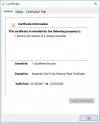nivrip
Yorkshire Cruncher
- Joined
- Mar 21, 2007
- Messages
- 11,467
- Reaction score
- 2,228
Can you try disabling it, then open the browser (not before) and see if it works? Kaspersky interrupts the SSL cert process as part of it's protection (at least it does on Kaspersky Internet Security, and I'm assuming the free version may do to).
.
Disabled Kaspersky Free but still get the "Site Insecure" message.

 .
.


 .
.